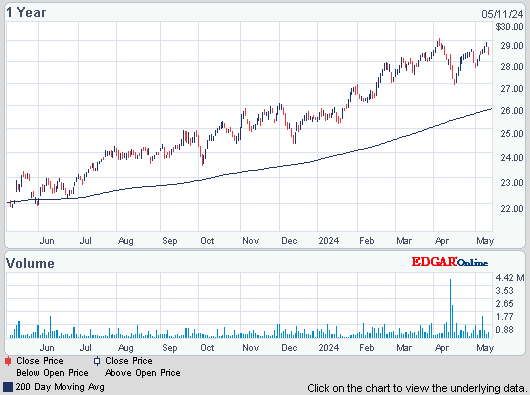Dow fell 8, advancers just ahead of decliners & NAZ went up 16. The MLP & REIT indices were fractionally higher in the PM. Junk bond funds crawled higher but Treasuries pulled back bringing higher rates. Oil is now at a 15 month high & gold had a tiny gain after being vastly oversold.
AMJ (Alerian MLP Index tracking fund)

AMJ (Alerian MLP Index tracking fund)
Treasury yields:
U.S. 3-month |
0.03% | |
U.S. 2-year |
0.37% | |
U.S. 10-year |
2.67% |
| CLQ13.NYM | ...Crude Oil Aug 13 | ....106.48 | (2.9%) |
![Live 24 hours gold chart [Kitco Inc.]](http://www.kitco.com/images/live/gold.gif)


Photo: Bloomberg
Federal Reserve (FED) officials expressed concern about how well the
central bank was conveying its policy intentions to a jittery investing
public, according to minutes from the most recent meeting. The Jun FOMC session was significant in that Big Ben followed it by telling the media that the FED was prepared to start winding down its bond-buying program by the end of 2013. The minutes indicated a clear concern from committee members, who gave
marching orders to Bernanke about what to say at the media gathering. "At
the conclusion of the discussion, most participants thought that the
Chairman, during his postmeeting press conference, should describe a
likely path for asset purchases
in coming quarters that was conditional on economic outcomes broadly in
line with the Committee's expectations," the minutes said. "In
addition, he would make clear that decisions about asset purchases and
other policy tools would continue to be dependent on the Committee's
ongoing assessment of the economic outlook." Financial markets reacted strongly to Bernanke's remarks, triggering the worst performance for stocks all year. The minutes indicated an in-depth discussion about how financial
markets were reacting to the quantitative easing measures, which entail
$85B a month in purchases of Treasurys & mortgage-backed
securities. "A few stated their view that a prolonged period of low interest rates would encourage investors to take on excessive credit or interest rate
risk and would distort some asset prices," the minutes said. "However,
others suggested that the recent rise in rates might have reduced such
incentives." Members
directed Bernanke to detail "a likely path" for a pullback in the asset
purchases that would be dependent on economic data continuing to
improve. In its economic
review, the committee said growth is increasing at "a moderate pace,"
language consistent with previous statements. There was some concern
that higher mortgage rates would derail the housing recovery, but most agreed that things were continuing apace. Some
members suggested the FED should establish benchmarks for QE reductions
along the lines of what it has outlined for interest rate increases. The FED set a 6.5% unemployment rate & 2.5% inflation as conditions for an increase in the target funds rate.
Many on Fed Want Further Jobs Improvement Before Tapering QE
Oliver Blanchard, the IMF chief economist, said he isn’t worried about an increase in US inflation & those who fear a short-term jump in prices are “plain wrong.” Blanchard said inflation can rise because of an overheated economy or people’s expectations of cost increases. “Neither of the two conditions is satisfied in the U.S. today,” he said. “So I’m not at all worried about inflation.” The FED is currently considering reducing its monthly bond purchases even with unemployment at 7.6% & the FED’s preferred inflation index showing prices rising 1% from a year earlier, below the central bank’s 2% goal.
IMF’s Blanchard Says He’s ‘Not at All Worried’ by U.S. Inflation
US oil production jumped last week to the highest level since Jan 1992, cutting consumption of foreign fuel & putting the US closer to energy independence. Drilling techniques including hydraulic fracturing (fracking) pushed crude output up by 134K barrels (1.8%) to 7.4M barrels a day in the week ended Jul 5, according to the Energy Information Administration (EIA). Rising crude supplies from oilfields including North Dakota’s Bakken shale & the Eagle Ford in Texas have helped the US become the world’s largest exporter of refined fuels including gasoline & diesel. The shale boom has also helped cut world reliance on OPEC oil even as global demand gains. The US met 89% of its own energy needs in Mar, the highest monthly rate since Apr 1986, EIA data show. Net imports of crude oil & petroleum products will fall to 5.7M barrels a day by 2014, down from 12.5M in 2005. Domestic crude output will average 7.3M barrels a day in 2013 & 8.09M in 2014. MLPs are building infrastructure for oil and gas.
Fracking Pushes U.S. Oil Output to Highest Since January 1992
Stocks did little. Big Ben will be speaking in a few mins, but probably won't bring a lot new to the table. It's hard to ignore the 1 percentage point the 10 year Treasury interest rate has risen since the start of May. In addition, junk bond funds have experienced price declines of more than 10% in the last 3 months. Rates are already on the rise. The major questions are how soon & how fast will the FED raise interest rates? But first comes Q2 earnings.
Dow Jones Industrials










No comments:
Post a Comment